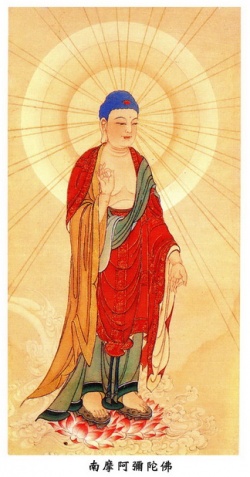Difference between revisions of "Reward body"
(Created page with "thumb|250px| <poem> '''reward body''' [報身] (Skt sambhoga-kaya; Jpn hoshin or hojin) One of the three Buddha bodies, the other two being the D...") |
|||
| Line 1: | Line 1: | ||
[[File:Amitabha 02.jpg|thumb|250px|]] | [[File:Amitabha 02.jpg|thumb|250px|]] | ||
<poem> | <poem> | ||
| − | '''reward body''' | + | '''[[reward body]]''' |
| − | [報身] (Skt sambhoga-kaya; Jpn hoshin or hojin) | + | [[報身]] (Skt [[sambhoga-kaya]]; Jpn [[hoshin]] or [[hojin]]) |
| − | One of the three Buddha bodies, the other two being the Dharma body and the manifested body. The reward body means a body obtained as a reward of completing bodhisattva practices. As the concept of three bodies developed, questions arose as to which Buddha possessed which body. Amida Buddha and Medicine Master Buddha were categorized as Buddhas of the reward body. Amida, for example, was believed to have been the bodhisattva Dharma Treasury in a past existence, but was reborn as a Buddha in reward for his Buddhist practice. In contrast with this early stage of the doctrine of the three bodies, it was later held that a single Buddha possesses all three bodies; in this sense, the three bodies can be regarded as three properties inherent in a Buddha, the reward body representing the property of wisdom. The Sanskrit word sambhoga-kaya literally means body of enjoyment or bliss body. When sambhoga-kaya was translated into Chinese, it was rendered as "reward body." | + | One of the three [[Buddha]] [[bodies]], the other two [[being]] the [[Dharma]] [[body]] and the [[manifested]] [[body]]. The reward [[body]] means a [[body]] obtained as a reward of completing [[bodhisattva]] practices. As the {{Wiki|concept}} of [[three bodies]] developed, questions arose as to which [[Buddha]] possessed which [[body]]. [[Amida]] [[Buddha]] and [[Medicine Master]] [[Buddha]] were categorized as [[Buddhas]] of the reward [[body]]. [[Amida]], for example, was believed to have been the [[bodhisattva]] [[Dharma Treasury]] in a past [[existence]], but was [[reborn]] as a [[Buddha]] in reward for his [[Buddhist]] practice. In contrast with this early stage of the [[doctrine]] of the [[three bodies]], it was later held that a single [[Buddha]] possesses all [[three bodies]]; in this [[sense]], the [[three bodies]] can be regarded as three properties inherent in a [[Buddha]], the reward [[body]] representing the property of [[wisdom]]. The [[Sanskrit]] word [[sambhoga-kaya]] literally means [[body]] of [[enjoyment]] or [[bliss]] [[body]]. When sambhoga-kaya was translated into {{Wiki|Chinese}}, it was rendered as "reward [[body]]." |
| − | See also three bodies. | + | See also; [[three bodies]]. |
</poem> | </poem> | ||
{{R}} | {{R}} | ||
Latest revision as of 09:47, 23 August 2013
reward body
報身 (Skt sambhoga-kaya; Jpn hoshin or hojin)
One of the three Buddha bodies, the other two being the Dharma body and the manifested body. The reward body means a body obtained as a reward of completing bodhisattva practices. As the concept of three bodies developed, questions arose as to which Buddha possessed which body. Amida Buddha and Medicine Master Buddha were categorized as Buddhas of the reward body. Amida, for example, was believed to have been the bodhisattva Dharma Treasury in a past existence, but was reborn as a Buddha in reward for his Buddhist practice. In contrast with this early stage of the doctrine of the three bodies, it was later held that a single Buddha possesses all three bodies; in this sense, the three bodies can be regarded as three properties inherent in a Buddha, the reward body representing the property of wisdom. The Sanskrit word sambhoga-kaya literally means body of enjoyment or bliss body. When sambhoga-kaya was translated into Chinese, it was rendered as "reward body."
See also; three bodies.
